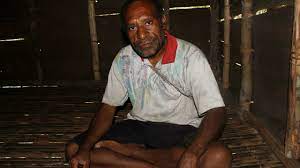Wiro Nongganop says he commands a battalion of West Papua independence fighters, but he has no guns, only bows and arrows, and lives in exile in a bark hut, sometimes surviving on potato leaves.
Nongganop and a few members of his Muyu tribe fled their homeland in 2019, crossing the poorly marked Indonesian border for the relative safety of remote western Papua New Guinea.
He says 700 men now live under his command, surviving by growing crops on muddy land gifted by the government while dreaming of an independent West Papua — an elusive goal since Indonesia took control of the western half of New Guinea island 60 years ago.
“If there were weapons we would make war,” Nongganop, a battalion commander in the OPM, or Free Papua Movement, told AFP, as he sat cross-legged in a hut alongside his deputy.
“But there are no weapons. If we use an arrow one time, they use a machine gun.”
West Papuan rebels have waged a low-level insurgency against Indonesia’s better-armed and better-trained forces for decades while struggling to gain international support.
Today, frustration, grinding poverty and alleged Indonesian rights violations have emboldened hardliners in the fragmented independence movement who want more direct military action.
Rebels have escalated their fight, targeting road contractors, as well as schools and clinics that they say have links to the military.
In April, they killed Indonesia’s intelligence chief in Papua, dramatically escalating tensions.
Jakarta responded by designating all separatists as “terrorists”, pouring more troops into the area and launching a series of bloody reprisal attacks.
United Nations envoys have expressed “serious concern” that Indonesia’s response has been excessive and appears “to reflect a broader pattern of racism” targeting indigenous Papuans.
Last year, they cited allegations of torture, the killing of Papuan civilians and the displacement of tens of thousands more.
They also expressed concern that Jakarta has sporadically cut internet access and de facto banned almost all foreign journalists from the area, making independent verification difficult.
The Indonesian government did not respond to requests for comment, but chief security minister Mahfud MD said this month that Papuans were equal citizens of Indonesia.
“Papuans are brothers to us the same like Javanese people, Sumatrans, Buginese and Acehnese people,” he said.
Nongganop may be lucky to be alive.
He fled following signs he was about to be taken in by Indonesia’s feared security forces, known as Kopassus, who regularly patrol the border villages.
He and his deputy cite the names and details of several ethnic Papuans who died or disappeared from their home area in suspicious circumstances in recent years.
“They carried out secret killings,” he said, blaming Indonesian security forces.
“It is a one-sided system. They don’t care about the people. Three Kopassus people came with a car and an armoured truck to take me from my house. So we ran away.”
He wishes someone would give them arms so they could fight back, but no one has in decades of conflict, leaving them with only traditional homemade weapons used for hunting: bows, arrows and spears.
And for people like Nongganop, life in Papua New Guinea’s poor Western Province has been tough, with survival a battle in itself.
Yapsi, also called ‘New Location’, is a hard place to be a subsistence farmer.
The land is poor, plants do not grow well and malnutrition and tuberculosis are common.
Children cannot easily go to school and are forced to play among tarpaulins bearing the names of various UN agencies that offer modest help.
Many of those who arrived in 2019 have already crossed the border back to Indonesia, despite the risks.
“It is difficult to find enough to eat. There is no food,” said Nongganop, adding the situation was too much for some.
“They were hungry. They could not stand it.”
Nongganop admits the road home is closed for him, at least for now.
Indonesian security forces know who he is, he says, and he would be in danger if he went back.
“I am scared to go back,” he said.
I will wait here for independence and then I will go back,” said Nongganop.
SOURCE: AFP/PACNEWS














